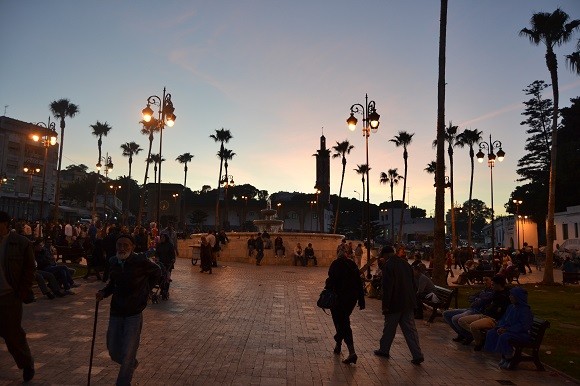 Every now and then in my travels I find a spot where I want to stop for a while.Damascus, Harar and the Orkney Islandshave all captured my imagination because of their rich culture and laid back atmosphere.
Every now and then in my travels I find a spot where I want to stop for a while.Damascus, Harar and the Orkney Islandshave all captured my imagination because of their rich culture and laid back atmosphere.
Damascus is lost, sucked into the maelstrom of a country intent on destroying itself. Harar and Orkney are far away. So I’m lucky to have discoveredTangier, Morocco, less than an hour’s flight from my home base of Madrid.
Set in a broad bay next to the Strait of Gibraltar, it’s been an important spot sinceancient times. On a high hill stands the Casbah, once the domain of the Sultan but now an exclusive neighborhood for rich Moroccans and an increasing number of expatriates. Below lies the medina, a jumble of houses and labyrinthine streets that are home to shopkeepers and laborers. There’s also a sprawling new city thanks to the booming port.
Tangier is a fascinating city. You can see all the tourist sights in two days and spend the rest of your life figuring the place out. Tangier has one of the most mixed populations I’ve seen. Arabs rub shoulders with Berbers from the Rif, Sahrawis from Western Sahara, and an increasing number of Senegalese and other migrants from sub-Saharan Africa. The men dress in everything from the traditional djellaba to T-shirt and jeans; the women in everything from the niqab to miniskirts. There’s also a long-established expat population of French, Spaniards and British.
This ethnic alphabet soup means you hear half a dozen languages as you walk down the street. The local Arabic is called Darija and is distinct enough that my rusty Levantine Arabic is almost useless. Berber is often heard too. If you don’t speak either of these languages, chances are that any individual Moroccan will speak French, Spanish or English, or perhaps all of them. I’ve never met an African who spoke fewer than three languages.
It’s often hard to know which language to use first. I generally start conversations in Spanish because that’s more widely understood than English, although one young guy immediately switched to English and asked, “Why are you speaking Spanish if you’re from an English-speaking country?” Conversations often slide from one language to another. This is a place where you can end up using four languages just asking a waiter for a cup of tea!
Speaking of tea, sitting in a cafe with a cup of Moroccan mint tea (cloudy with sugar and with the mint leaves still floating in the water) is the best way to see Tangier. The locals love to relax with friends and watch the world go by. My favorite place to sit is the Petit Socco, a small square in the center of the medina through which everyone seems to pass. Not far off and outside the old city walls is the Grand Socco. It’s even more lively but the blaring traffic makes it less relaxing.
You won’t have to sit long before you’ll get in a conversation with someone. Moroccans are very social and you can learn a lot about life in their country by spending a couple of hours lounging in a cafe. I’ve been treated to everything from Berber tales of spirit possession to catty gossip from longtime expats.
Tangier used to have a bad reputation for hustlers and touts. They’ve been mostly cleaned out in recent years although you’ll still have young guys coming up to you asking to be your guide. A polite “no” will work if repeated two or three times. This doesn’t work in Marrakesh or Fez! Once you’ve been around a couple of days they’ll all recognize you and stop asking.
There are other advantages to staying for a while. Most visitors spend only a day or two in Tangier, or come as day trippers from Gibraltar or Tarifa and disappear after a few hours. The locals quite understandably see these people only as sources of money. Once the folks in Tangier have seen you around for a few days they start getting curious. Soon you’ll get to know the people who hang out at your regular cafes. The kids will start following you to get English lessons. You’ll start getting invitations for lunch or parties or day trips.
This, of course, works most places. What makes Tangier special is the diverse range of people to meet and the vibrant feel to the place. It’s a place of constant movement. People come here to make their fortunes or to use the city as a launchpad to get to Europe. It’s welcoming to newcomers because so many people are newcomers. You’ll meet a lot of interesting people with interesting dreams in Tangier and to become part of the scene in this endlessly interesting city requires only a bit of time and an open mind.
Almudena Alonso-Herrero
Posted Jul 15th 2013 11:20AM by Sean McLachlan
Tags: adventure, Arabic, cafes



